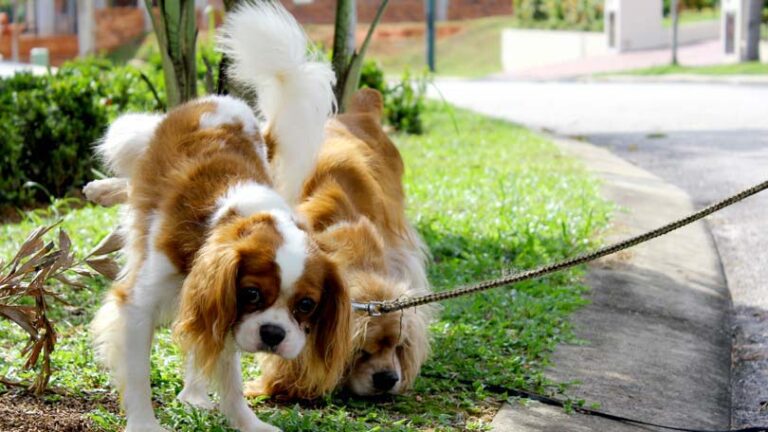Kennel Cough – Infectious Tracheobronchitis
Kennel cough is an extremely common respiratory ailment affecting dogs. The disorder, which can also be called infectious tracheobronchitis, is not a single disease but rather is the way in which dogs react to a number of infectious microorganisms. The bacteria Bordetella bronchiseptica is implicated in many cases of kennel cough, but other bacteria and several different types of viruses (e.g. parainfluenza virus) can be to blame as well. Dual infections involving both Bordetella and a virus are not uncommon. Whichever pathogens are involved, the infection is limited to a dog’s trachea (i.e. the windpipe) and the larger passageways for air that branch off it and lead into the lungs.
When a dog with a respiratory infection coughs or sneezes, large numbers of microorganisms are released into the environment. Nearby dogs may breathe in the bacteria and/or viruses or the pathogens can contaminate surfaces, which then pose a risk to dogs coming into contact with them in the future. All of the bacteria and viruses that produce kennel cough are highly contagious, so dogs that are in frequent, close contact with other dogs are at highest risk. Stress can also play a role by reducing an animal’s ability to mount an effective immune response. Animal shelters and boarding kennels are the perfect breeding grounds for outbreaks of kennel cough. Dogs attending pet shows, grooming facilities, agility trials, puppy classes, visiting dog parks, or even those that simply greet neighborhood dogs on walks or through fences are also at risk.
Young or unvaccinated animals and those with underlying respiratory disease or immune dysfunction are more vulnerable to kennel cough. Owners should be aware that preventative vaccines are available for only a few of the causative agents, so vaccination does not offer complete protection against the disease.
Symptoms of Kennel Cough
The cough associated with infectious tracheobronchitis is typically dry, meaning that only a small amount of sputum is produced, but is very persistent. It is not unusual for infected dogs to cough for several weeks before their symptoms resolve. In uncomplicated cases of kennel cough, dogs generally still feel pretty good. They continue to eat well and be fairly active, although exercise can worsen their coughs.
In some cases, infection can move from the dog’s air passageways and into the lung tissue itself, producing pneumonia. These dogs are much sicker than is typically seen with straightforward kennel cough.
Symptoms of pneumonia include:
- fever
- lethargy
- loss of appetite
- a moist cough that produces a lot of phlegm
- nasal discharge
- difficult or rapid breathing
If a dog’s symptoms progress from those that are usually seen with kennel cough to those that are more typical of pneumonia, seek veterinary help immediately.
Diagnosis
Many veterinarians will diagnose kennel cough based on knowledge of an animal’s history and potential risk factors, its clinical signs, and a thorough physical examination. If the dog’s lungs sound clear (indicating that pneumonia is most likely not present), if it does not have a high fever, and all other signs are pointing towards kennel cough, additional diagnostic tests may not be necessary. But, if at any point the veterinarian is concerned about the dog’s condition, he or she will usually want to take chest x-rays. The x-rays can reveal the inflammation in a dog’s airways that occurs with kennel cough, but the veterinarian is most interested in finding signs of pneumonia or any of the other serious causes of a cough in dogs. Blood work and additional testing may be necessary if a veterinarian suspects that kennel cough is not to blame for a dog’s symptoms.
Usually it is not necessary to determine exactly which pathogen is involved in a case of kennel cough, but that can change if a dog’s condition fails to improve as expected or if a large outbreak is underway. In these cases, a veterinarian may recommend a tracheal wash or other procedures to collect a sample of microorganisms from within the dog’s respiratory tract and send it to the lab for pathogen identification. Different antibiotics can be tested against bacteria taken from within a patient’s own body to determine which drugs will be most effective.
Treatment and Prevention of Kennel Cough in Dogs
A simple case of kennel cough in an otherwise healthy dog may not require any treatment other than some time, rest, and supportive care. If a pet’s condition worsens or fails to improve over a week or two, be sure to call the doctor. Veterinarians will sometimes prescribe cough suppressants and antibiotics to help keep a more severely affected pet comfortable and to speed its recovery. Keep in mind that antibiotics will not improve cases of kennel cough that are caused by viruses. Pets that have been diagnosed with kennel cough are potentially very contagious and should be isolated from other dogs until their symptoms have completely resolved.
If pneumonia is a concern, more aggressive therapy will be necessary. Dogs may need to be hospitalized to receive injectable antibiotics, oxygen therapy, supportive care, and medications and procedures to help loosen phlegm until their condition is stable enough for their owners to complete their care at home.
Preventative vaccination is available against some, but not all, of the bacteria and viruses that cause kennel cough. Dogs that are in frequent contact with other dogs or with potentially contaminated environments should be vaccinated against potential respiratory pathogens. Protection against several of the viruses that cause kennel cough are included in the DHLPP vaccine that is regularly given to dogs. Recommended vaccination schedules vary according to a dog’s age , vaccine history, and risk factors. Annual vaccination against Bordetella bronchiseptica is sufficient for most pets, but dogs that are at a higher than average risk (e.g. show animals or frequent boarders) can benefit from receiving the vaccine every six months.
Prognosis
Most cases of kennel cough resolve fully and without complications within a few weeks of an owner first noticing a cough. In many ways, kennel cough is to dogs what the common cold is to their owners. However, animals with especially severe cases or with weakened immunity can become extremely sick and may even die from the disease. It is always better to err on the side of caution and have a coughing dog examined by a veterinarian than to allow a potentially serious disease go undiagnosed and untreated.
Article By:
Jennifer Coates, DVM graduated with honors from the Virginia-Maryland Regional College of Veterinary Medicine in 1999. In the years since, she has practiced veterinary medicine in Virginia, Wyoming, and Colorado and is the author of several short stories and books, including the Dictionary of Veterinary Terms, Vet-Speak Deciphered for the Non-Veterinarian. Dr. Coates lives in Fort Collins, Colorado with her husband, daughter, and a menagerie of pets.

Having discovered a fondness for insects while pursuing her degree in Biology, Randi Jones was quite bugged to know that people usually dismissed these little creatures as “creepy-crawlies”.







